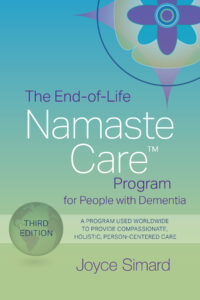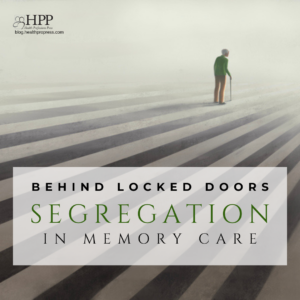
Tips for Mealtimes with the Namaste Care Program
The Namaste Care™ program is a holistic end-of-life care program for people with advanced dementia. This approach affirms the individuality and enduring spirit of each person through comforting and meaningful sensory-based experiences. Namaste Care ensures that people receive specialized services and activities that are meaningful at this stage of their lives. The emphasis is not on the number of days left in a person’s life, but on the quality of those days. Here are some tips on how care partners can make dining a pleasurable experience, even if the person needs extensive cueing or can no longer eat independently.
Helping people eat is a challenge for many care homes, as this type of care is very time consuming for care partners who have many people to assist during meals. In the United States, regulations in all states prohibit anyone from helping to feed people until completing a special education program. Assisting with meals should be a priority for all care partners. Suggestions for how to add extra hands and create a conducive atmosphere during mealtimes include the following:
- Educate administrative staff and department managers on how to assist with dining, if allowed by regulations.
- Stagger working hours so that extra hands are available in the dining room during the morning and evening meals.
- Play soft music during meals.
- Make sure care partners are talking to the people they are helping and not just to other care partners.
- Provide beverages to care partners so they feel that they are part of the dining experience. Some people with dementia still remember that it is impolite to eat in front of someone who has no food or beverage. When the care partner has a beverage, the person with dementia may feel more comfortable eating in front of them!
- Use clothing protectors that do not look like bibs, such as large linen napkins tucked under the chin, bib aprons, or barbecue aprons.
- Do not use institutional-looking meal trays.
- If possible, divide people into small groups to minimize the noise and confusion of eating in a large room. This change can be implemented inexpensively with portable privacy screens.
Many dining rooms in care homes are quite loud, with staff and residents talking. One useful goal is to create a more peaceful and calming atmosphere in the dining room.
For more care tips on working with people with advanced dementia, check out The End-of-Life Namaste Care™ Program for People with Dementia, Third Edition.
Read the book!
 The End-of-Life Namaste Care™ Program for People with Dementia, Third Edition
The End-of-Life Namaste Care™ Program for People with Dementia, Third Edition
By Joyce Simard, M.S.W.
Copyright © 2023 by Health Professions Press. All rights reserved.
Caring for people with advanced dementia presents unique challenges that the Namaste Care™ program addresses using simple, holistic practices. Through comforting and meaningful sensory-based experiences, this enlightened approach to care honors the enduring spirit of each person. Proven effective in skilled nursing facilities, assisted living memory care communities, and hospice organizations, this evidence-based approach has been implemented and validated around the world.





Add comment